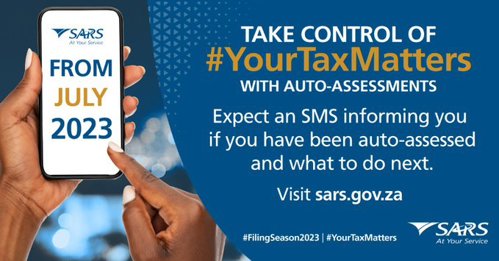SARS’ New Auto Assessments Explained
14 AUGUST 2023
The 2023 tax season has brought about some rule changes and new facilities available for the taxpayer – including auto assessments. In this article we explain how this new process works.
The South African Revenue Service (SARS) has introduced significant changes to the tax assessment process for the 2023 tax season, with the implementation of auto assessments. This new system aims to simplify and expedite the tax filing process for individuals and enhance efficiency for SARS. In this article, we will explore the concept of auto assessments, discuss how they work, and provide essential information to help taxpayers understand and navigate this new process.
What is SARS Auto Assessment?
Auto assessment is a new feature introduced by SARS in which the tax authority uses third-party data and information already available to them to pre-populate taxpayers' tax returns. Based on this pre-filled information, SARS generates an initial assessment, which taxpayers can accept or review and amend as necessary – this ensures that the power is not taken out of the hands of the taxpayer in the end. This system is designed to streamline the tax filing process by reducing the manual effort required to complete a tax return and ensure accuracy by leveraging existing data.
How Does Auto Assessment Work?
SARS gathers information from various sources, such as employers, financial institutions, medical aid schemes, and other third parties, to populate the tax returns of eligible taxpayers. This information includes details such as income earned, deductions, medical expenses, and retirement contributions. Once the pre-populated tax return is ready, SARS sends a notification to the taxpayer via SMS, email, or through the SARS eFiling platform.
Reviewing the Auto Assessment
Upon receiving the auto assessment notification, taxpayers have the opportunity to review the pre-populated information and make any necessary changes or additions. It is crucial to carefully review the auto-assessed return to ensure accuracy. Taxpayers should compare the auto assessment with their own records, consider any additional income or deductions that may not be captured, and make amendments accordingly.
Accepting or Disputing the Auto Assessment
After reviewing the auto assessment, taxpayers have three options: accept the assessment, edit the return online, or request a manual assessment. If the auto assessment accurately reflects the taxpayer's financial situation, they can simply accept the assessment and conclude the tax filing process. However, if discrepancies or omissions are identified, taxpayers can make the necessary changes online. Alternatively, taxpayers who prefer not to use the auto assessment system can opt for a manual assessment, which involves completing the tax return themselves.
Inclusions and Exclusions:
Auto assessments cover a wide range of income sources, such as employment income, investment income, and certain deductions. However, there may be some sources of income or deductions that are not included in the auto assessment process. For example, if you have additional freelance income or self-employment earnings, you may need to manually enter those details into the tax return.
Income Discrepancies:
In some cases, there may be discrepancies between the auto assessment and your actual income. This can occur if the data provided by employers or financial institutions differs from your actual earnings. If you notice such discrepancies, it's important to make the necessary adjustments to ensure that your tax return accurately reflects your income.
Document Retention:
Even with auto assessments, it's essential to retain relevant supporting documents, such as pay slips, invoices, and receipts, as SARS may request them for verification purposes. Keeping organised records will help you provide the necessary documentation if required.
Potential Changes:
It's worth noting that auto assessments are a relatively new feature, and SARS may make adjustments and improvements based on feedback and changing tax regulations. Therefore, it's important to stay updated with the latest information from SARS to ensure you understand any changes to the auto assessment process.
Assistance and Support:
If you have questions or encounter any issues with the auto assessment, SARS provides support through various channels. You can contact their helpline, visit a SARS branch, or access resources on the official SARS website. Utilising these resources can help clarify any uncertainties and ensure a smooth tax filing experience.
The introduction of auto assessments brings several benefits to taxpayers. It saves time and effort by reducing the need for manual data entry, minimises errors that can occur during manual filing, and expedites the assessment process. However, it is important to note that auto assessments are based on information available to SARS at the time of processing. This still makes it important for you to double check details, however, for those without any complicated tax benefits or earnings, this allows the process to be a lot less daunting.



